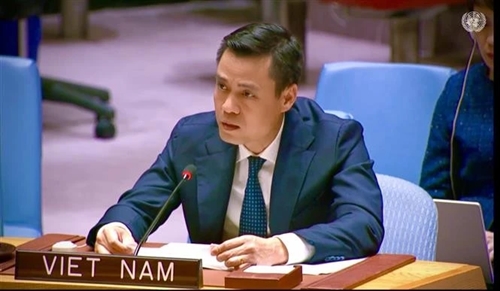Addressing an open debate of the U.N. Security Council on strengthening maritime security through international cooperation for global stability, Ambassador Giang urged all countries to fully adhere to their obligations under the convention, respect the sovereignty, interests, and legitimate economic activities of coastal states, and settle disputes by peaceful means in accordance with international law.
He highlighted the importance of respecting diplomatic and legal processes, ensuring freedom, safety, and security of navigation and overflight, and avoiding actions that could further complicate the situation.
    |
 |
|
Ambassador Dang Hoang Giang, Permanent Representative of Vietnam to the UN, addresses the debate. |
The Vietnamese representative reiterated that as a coastal nation, Vietnam supports all efforts and initiatives that promote maritime safety and security. Given this, it has actively cooperated with countries and partners both within and outside the region in combating crime and ensuring security in the East Sea (South China Sea), he said.
The country has made substantive contribution to regional mechanisms and forums led by the Association of Southeast Asian Nations (ASEAN), and has maintained regular joint patrols and information exchanges with neighboring countries such as China, the Philippines, and Malaysia. These efforts have strengthened law enforcement cooperation and emergency response at sea, stated the diplomat.
Vietnam reaffirmed its commitment to fully implementing the Declaration on the Conduct of Parties in the East Sea (DOC) and continuing to work with other countries to accelerate negotiations on an effective and substantive Code of Conduct in the waters (COC) that is in line with international law, especially UNCLOS.
Addressing the debate, U.N. Secretary-General Antonio Guterres expressed deep concern over growing instability in many regions. He emphasized that ocean security is under threat from a range of traditional and non-traditional challenges, including piracy, transnational crime, maritime disputes, cyberattacks, sabotage of undersea infrastructure, and escalating geopolitical tensions.
He noted that attacks on vessels, various forms of smuggling, terrorism, and other illegal activities continue to occur in regions such as the Red Sea, the Gulf of Aden, the Mediterranean Sea, the Gulf of Guinea, and beyond. The U.N. Secretary-General appealed to the international community to step up collective action based on respect for international law, especially the UNCLOS 1982, to address the root causes of maritime insecurity and to build partnerships at all levels.
Ambassador Giang expressed strong support for the Secretary-General’s call and proposed several key directions for coping with current maritime security challenges.
He stressed the need for enhancing substantive cooperation among countries, particularly through the promotion of joint patrols in regions experiencing instability. He also emphasized investing in surveillance technology, data sharing, and capacity-building support for developing countries.
Furthermore, the diplomat underscored the importance of strengthening coordination mechanisms and ensuring effective collaboration between U.N. bodies and regional mechanisms in implementing measures to ensure maritime safety, freedom, and security. He affirmed that the U.N. Security Council, as the primary body responsible for maintaining international peace and security, also plays a leading role in enhancing maritime security.
Ambassador Giang also called on countries to continue updating and strengthening existing legal frameworks to respond to emerging maritime security challenges more effectively.
The debate reflected a broad consensus among countries on the urgent need to accelerate collective action to safeguard the shared maritime domain, ensure safety, and promote sustainability in maritime activities – all of which are becoming increasingly vital to global economic development, peace, and stability.
Source: VNA